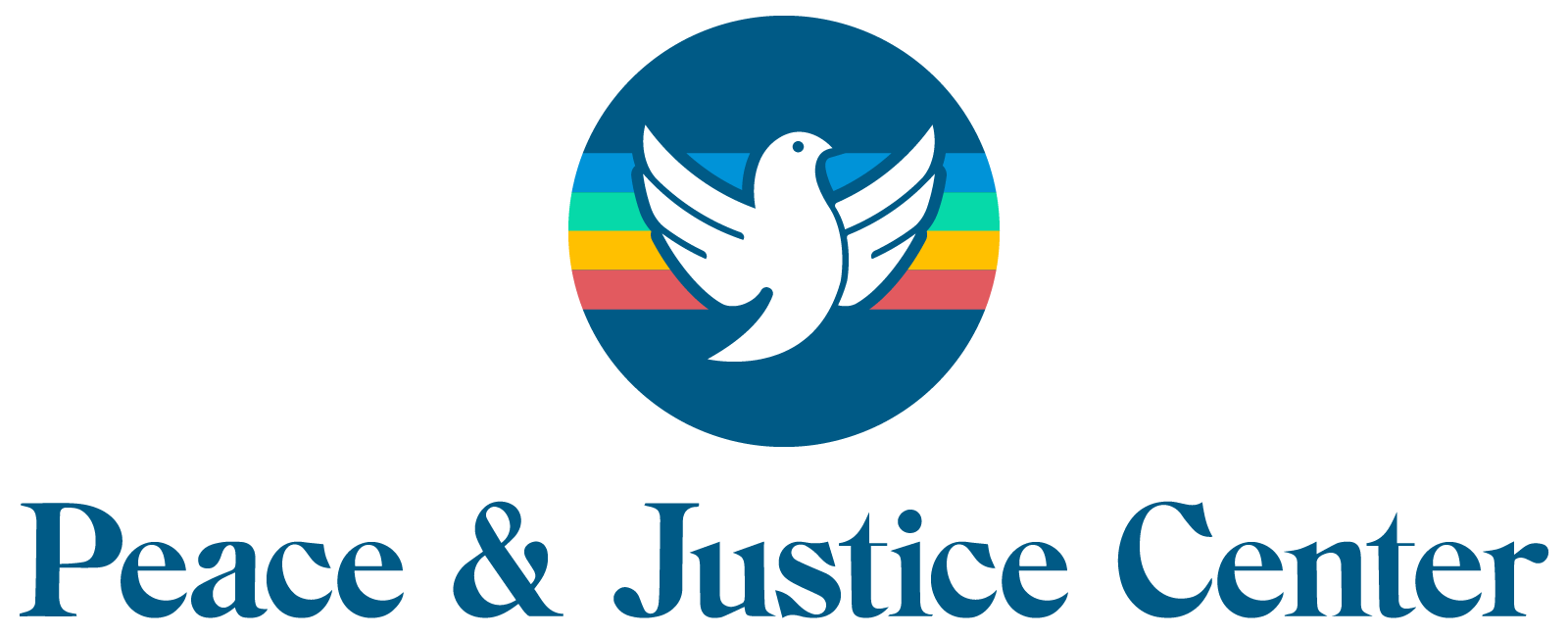Approved by Peace & Justice Center Board of Directors 6/24/2019
Over the years, the Peace & Justice Center (PJC) has raised concerns over the militaristic, anti-democratic tendencies of many countries as well as criticized U.S. foreign policy, military aid, and sales that exacerbate tensions and feed continued violence in the world.
The Israeli-Palestinian situation continues to deteriorate. The Peace & Justice Center is committed to nonviolence and seeks a world in which Palestinians and Israelis live in equality and dignity, and with national self-determination. We are both saddened and angered by the continued violence perpetrated by Hamas and the State of Israel and by United States’ complicity in it all.
In this statement, we focus our concern on the State of Israel. It has the greatest military and institutional power in the region and is in a position to be a force for peaceful change. It is also the most democratic nation in the region, and the PJC is committed to its survival. However, it is distressing to watch Israel adopt more and more policies reminiscent of those formerly found in apartheid-South Africa. Reasserting itself as a “Jewish state” in The Basic Law: The Nation State of the Jewish People (enacted July 19, 2018), it declares that only the Jewish people have the right to national self-determination and that the development of Jewish settlements is a national value (The National, 2018). This legislation, along with others (Adalah.org, Human Rights Watch), enables the Israeli government to legally discriminate against Palestinians. Israel denies Palestinians due process under the law, destroys Palestinian homes and appropriates their lands to establish more Jewish settlements, collectively punishes Palestinians by destroying homes, mosques, and schools for suspected acts of terror by individuals, and, under an expanded definition of “acts of war,” exempts the State from liability for injuries or damage inflicted on persons in or from the Occupied Palestinian Territories (OPT), even if its acts violate international law. These laws also exempt Israeli actions taken in Gaza. Finally, emboldened by substantial United States government support, Israel continues with its disproportionate retaliation against Gaza that has nearly crushed the Arab civilian population and denies access to construction materials, water, electricity, and medical supplies, thereby perpetuating poverty and appalling health conditions. (Human Rights Watch, 2018)
Those of us, who care about a democratic Israel and believe that it can adopt policies to advance peace with its Arab neighbors, call for increased international pressure aimed at changing its behavior. To this end, the Peace & Justice Center has decided to join the Boycott, Divestment, and Sanctions (BDS) movement, which works to pressure Israel to comply with international law. BDS, a nonviolent movement started in 2005, calls for:
* Ending Israel’s occupation and colonization of all Arab lands and dismantling the Wall;
* Recognizing the fundamental rights of the Arab-Palestinian citizens of Israel to full equality;
* Respecting, protecting, and promoting the rights of Palestinian refugees to return peacefully to their homes and properties, as stipulated in UN Resolution 194.
BDS is a global movement composed of unions, academic associations, churches, and grassroots organizations across the world. It is an inclusive, anti-racist human rights movement that is opposed on principle to all forms of discrimination, including anti-Semitism and Islamophobia.
Boycotting, divesting, and sanctioning (BDS) Israel are neither unique nor isolated policies. The U.S. government, for example, is presently engaged in BDS-like actions aimed at Syria, Iran, Russia, North Korea, Cuba, and Myanmar. In the past, we targeted South Africa (1986-91), North Vietnam (1964-75), Nicaragua (1985-89), Indonesia (1999), and the Palestinian National Authority (2006-07). In all instances, we have pressured governments to act more peacefully and in accordance with human rights principles. This BDS effort aimed at Israel operates within this same tradition.
We recognize that this action will be unpopular in certain circles and that PJC may be attacked for being anti-Semitic because of its stance on Israel. Quite the contrary, it is our commitment to the survival of the state of Israel and to democratic values that calls us to pressure it to live up to its declared ideals.
BDS principles are consistent with PJC’s values and mission statement. Our store purchasing policies and programmatic activities are aligned with these principles. We urge concerned citizens and other organizations to examine their policies and practices as well.
We believe that Israel can and must adopt more humane, just, and peace-making policies.
Sources:
- Adalah.org (2017) Discriminatory Laws in Israel
- Adalah.org (2018) Discriminatory Laws Database
- Human Rights Watch (2018), World Report 2018 – Israel and Palestine, New York.
- The National (December 10, 2018) For Arab citizens of Israel, Nation State law is as bad as apartheid.
- Palestinian National Committee (n.d.), What is BDS.
- The Times of Israel (2018), Final Text of the Jewish nation-state law, approved by the Knesset early on July 19.
- United States Department of State (2018) Country Reports on Human Rights Practices for 2017.
